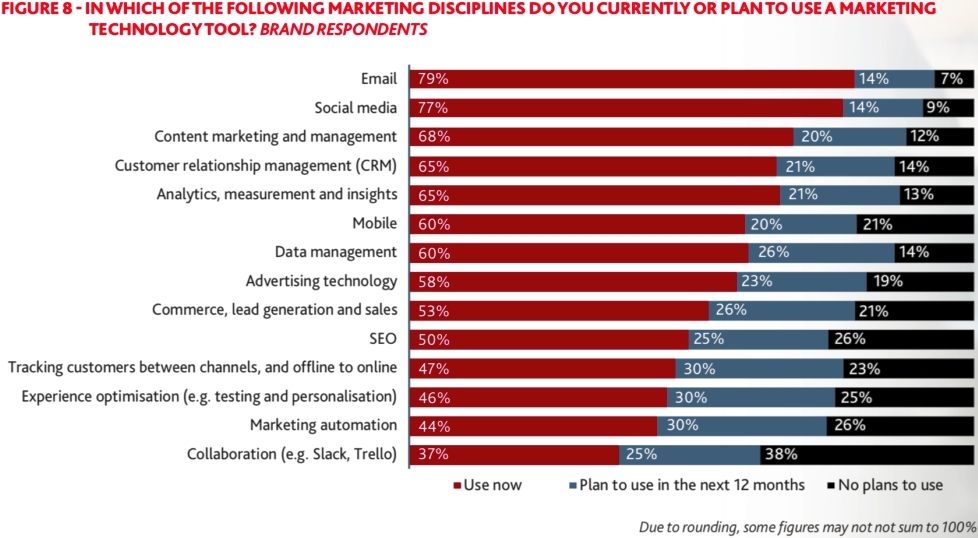
Marketing technology is nothing but reimagining what marketing can do in a digital world. Commonly referred to as martech, it encompasses a range of software and tools that enable you to achieve your business’ marketing goals or objectives in a digitally-driven world.
Marketing is advancing as a technology-powered discipline. Given its rapid growth, the martech industry is now valued at over USD 121.5 billion worldwide. With business continuity planning being underscored by the pandemic, companies already invested in martech gained an advantage over their peers through agile systems. These enabled them to seamlessly steer their marketing efforts to the cloud in the new normal.
Some of the most commonly used martech capabilities are concerned with smoothening the process of reaching your customers with the most contextual messaging at the right time.

Source: https://www.clickz.com/martech-industry-2020-report/256902/
In this space, marketing automation platforms such as MailChimp and Sendinblue help you design, customize and blast your emails to different audience segments with niche messages, at different times of the day at scale.
Social media
Buffer and Hootsuite are some of the most popular platforms leveraged by companies to schedule their social media content, track user generated responses, and monitor and analyze their social perception and how they stack up against their competitors. All this helps them to better strategize for the future.
Content
Tools like SEMRush help content creators discern the best keywords to use to create high-ranking content. It also offers an SEO writing assistant to help you understand the gaps in your copy as you write. Hemingway Editor is a similar platform helping you write clean, crisp and engaging content. These and many more help marketers in their content creation, optimization, distribution and measurement so that you can work up the ranks quicker.
Another subset within content martech is DAM or digital asset management. DAM platforms enable organizations to manage and store digital content from a centralized repository, allowing it to be reused across all channels and geographies, ensuring consistency.
Customer Relationship Management (CRM)
CRM platforms such as HubSpot and Salesforce help you to organize, monitor, and build better relationships by managing your contacts via a customizable database while running sales, marketing, customer service, and content management.
Customer Experience Management (CX)
Platforms like Qualtrics enable marketers to gain a single view on customer, product, brand & employee experience insights across all channels to take strategic marketing calls and make timely moves geared towards customer satisfaction.
Advertising
Google Adwords and Bing ads by Microsoft are good examples of marketing technology tools that help you automate advertising campaigns across various platforms. These include programmatic ads, display ads, social and media ads, to name a few. They also enable marketers to view their campaign performance and make the necessary adjustments to maximize viewership and ROI from their advertising budgets.
Rich media
These tools help marketers create stunning visual and design collateral to drive maximum visibility and penetration. Various design and video editing software along with podcasting tools would fall within this bracket of marketing technology.
Data Analytics
These essentially garner data from an amalgam of third party platforms to help refine your firm’s media buying decisions, monitor and ride on relevant trends and drive better targeting moves across channels. A couple of platform examples in this light would be Google Analytics and Kissmetrics.
Any technology that can provide sales enablement, as well as help your business gain and keep customers, is an asset for your organization. As a CMO or CTO, while doing your research, some of these solutions may give you a sticker-shock, the solutions are generally worth the man hours you would save and the leverage it gives your business in terms of actionable insights, given the fact that each of your marketing efforts are measured.
Automation
For any company to thrive, sustainable solutions are key. And to stay sustainable brands need scalability. That’s where the ingrained automated capabilities of most martech platforms are so highly valued. Marketing automation empowers your marketers to set up processes once and for all - whether it’s scheduling social media posts to stay relevant to a customer in a different time zone or to ensure the best ad display on mobile, martech platforms take care of it all.
This leaves your team to focus on more complex and expertise-demanding tasks rather than spur a burnout due to the rigmarole of creating performance presentations to prove the value of their hard work. Which brings us to our next point.
Measurability
By employing martech capabilities, organizations can constantly measure the value of their efforts, compare themselves to the prevailing industry competition and make timely augments to drive differentiation. This means for every promotional email that costs you next to zilch to that highly planned, interactive website interstitial or display ad, everything is measureable.
Marketers can get a seamless view of how their promotional collateral has fared across various parameters such as age, gender, geography, interest, device, impressions and engagement garnered at a particular time of the day etc. All of this information is typically made available for marketers through intuitive real-time dashboards which also offer the option to download those numbers in a presentable format to dole out to the higher management, fuelling strategic marketing decisions
Enhanced targeting
Since various forms of martech allow you to capture invaluable customer data, these tools are indispensable for organizations looking to expand their customer base and drive unparalleled loyalty without burning a hole in the pockets, over the long haul. The data gathered can then be used to create highly segmented customer personas, identify leads for further nurturing, and reach out to them with contextual and need-evoking messaging.
Moreover, CRM platforms help you stay in constant touch with your customers, understand their evolving needs and cater to them in a personalized manner, thereby driving sustained loyalty. The customer feedback gathered through these platforms enables a continual refining of your sales strategy, thereby helping you view the effectiveness of your efforts in numbers.
While martech is an obviously exciting horizon to be on, it's easier and riskier to get carried away. What we mean is that every business comes with its own unique needs. And therefore, whatever combination of martech capabilities you use to build your tech stack, what’s key is to ensure that it aligns with your business objectives and strategy and not vice versa. Instead of growing taller, technology stacks are getting smarter, more streamlined, and ultimately more interconnected to cope with the ambiguity of the pandemic and beyond.
At Urja, we can equip and facilitate you with martech capabilities to stay distinct, relevant and nimble with your marketing efforts, without compromising on quality or scale. To understand the capabilities best suited to your business and how you can harness the full potential of martech, contact us today.
Leave a comment
Comments (0)